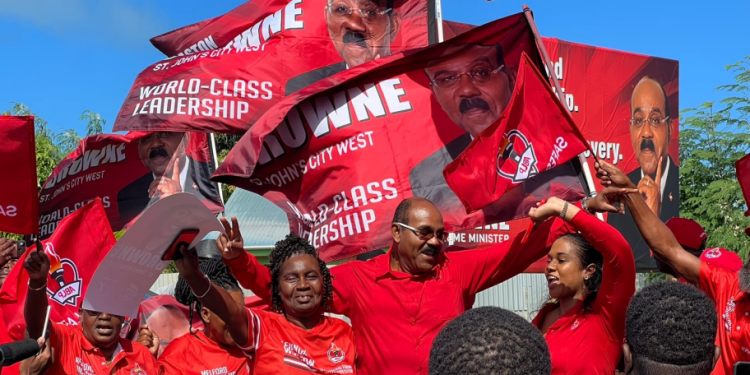On 12 June 2014, or eleven years ago on this day (yesterday), the people of Antigua and Barbuda decided to elect a new government to serve their needs. The United Progressive Party (UPP) was defeated after ten years as Government, from 2004 to 2014, by the Antigua and Barbuda Labour Party (ABLP), led by the Honourable Gaston Browne.
The ABLP won 14 of the 17 seats, and the UPP won 3. Barbuda was won by ABLP Arthur Nibbs who defeated the BPM/UPP candidate by a single vote. Nonetheless, the entire victory was decisive and the people spoke loudly. They rejected the majority mandate that had been given to the UPP administration in 2004 and in 2009, and they armed the ABLP with the power to govern, believing that the heritage party was indeed “Ready To Rebuild”.
Whenever a country turns to the International Monetary Fund (IMF) for funding, it is because no other lending institution will provide needed capital; the IMF is the bank of last resort. The UPP borrowed $320,000,000 including interest from the IMF, beginning shortly after the start of its second term; that sum was not invested but spent to meet regular obligations.
When the 6th June 2014 arrived, and time for repayment had arrived, the UPP defaulted. The general elections were six days away, on 12 June 2014. This particular failure led the Antigua and Barbuda people to reject the incumbent; they turned to a renewed Labour Party. By 2018, the IMF debt was repaid in full, a decade ahead of the scheduled time given.
Debts owed and unpaid by the UPP regime in 2014 included more than $80,000,000 owed to the West Indies Oil Company for fuel delivered to the electricity plant; a debt in excess of $120,000,000 owed to Antigua Power Company for unpaid electricity provided; a debt in excess of $22,000,000 owed to Sembcorp—the provider of potable water by reverse osmosis; a failed ABI Bank that would cost more than $375,000,000 to resolve and to save the banking system. Antigua and Barbuda was on the verge of becoming a failed State in 2014. The ABLP would win the general elections of 2018 and again in 2023, reviving the mandate of 2014, in each case.
The UPP has, since 2014, alienated many of its talented members who have joined with the ABLP to ensure that better governance remains in the hands of the superior political party and government. Eleven years of successful governance have provided a clear measurement of the effectiveness of the incumbent administration, led by Prime Minister Gaston Browne. The economy has expanded exponentially, jobs and investment opportunities have multiplied, new housing has become available to more than 3,000 households, and crime has been driven to very low levels. The gross domestic product has almost doubled since 2014.
Government transparency and openness have become commonplace, in the eleven years since 2014, including weekly briefings by a spokesperson for Cabinet whose responsibility has been to appear before reporters who ask probing questions. In the Parliament, there is a half-hour dedicated to allowing the Opposition members to ask questions of the Prime Minister; the Prime Minister responds spontaneously, since no questions are submitted in advance.
The losing UPP has resorted to joining with those who wish to harm Antigua and Barbuda and to destroy the ability to attract foreign direct investment, required for economic expansion and increased investment opportunities. Their recent alignment with a Russian plaintiff, claiming ownership of the Alfa Nero yacht that was sold by auction, is a clear example of unpatriotic and untruthful assertions; the Russian dispatched an investigator to Antigua, seeking to find dirt on government officials and family members of the Prime Minister. The UPP operatives gladly collaborated with fictionalized accounts. That matter has come to an end in the US court.



